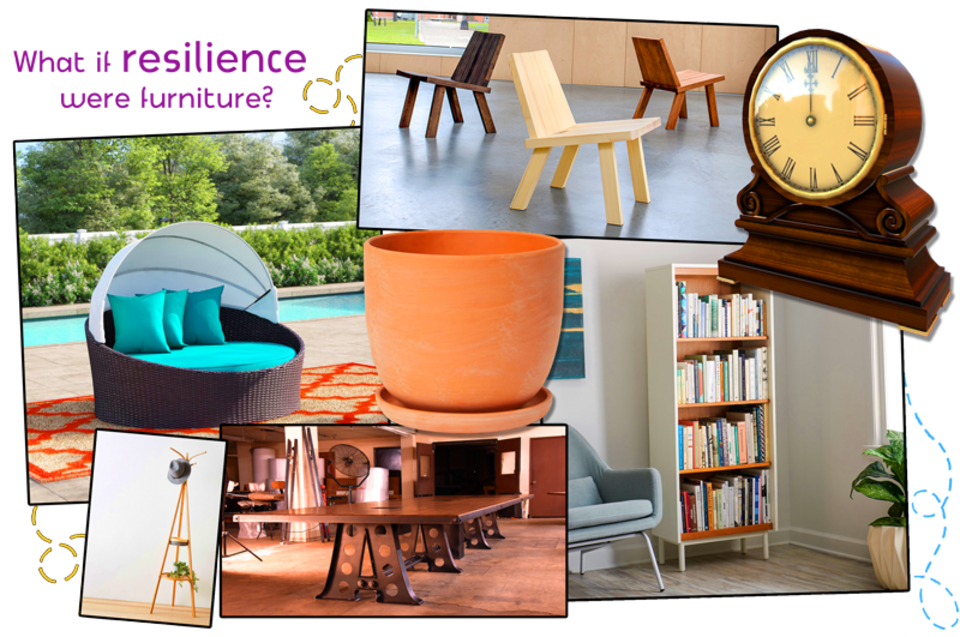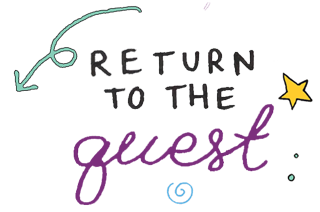
Resilience, part of the furniture!
This activity is reproduced with permission from the board game "Kookception: Philo at Play" created by our community partner Brila as part of its philocreation approach.
...
| Objective: To better understand the concept of resilience by stretching it out in all directions through mini-missions of playful thinking! |
Duration: 15 to 45 minutes
Material:
Sheets of paper and pen
Coloured pencils and markers
Your imagination
Instructions:
Mission 1: Define the concept. Imagine a very curious alien who wants to understand the human world, but who doesn't have the same concepts on their planet. How would you explain resilience to them by giving a definition of the concept and examples from planet Earth? Keep track of all your ideas because they will be useful for the following activities, like Creative Conception and Creative Construction!
Mission 2: Imagine the concept. If the concept of resilience were a living creature, what would it look like and why? Close your eyes and visualize how it would act and speak, also thinking about its attitude and life plans. Then imagine that resilience is going out to sing karaoke with its friends! What song would it pick to sing if it wanted to reflect its true self? Would it be a slow song, a smooth rhythm or a hyper beat? What would be its performance style? Timid? Confident? A cool rocker or a total diva? Now think about who among its concept friends it would invite up on stage to sing a duet! What would they sing and why? If you’re feeling the star quality, you can even mimic resilience’s karaoke show!
Mission 3: Compare the concept. It’s sometimes by making comparisons that you can discover new ideas! In this game of wacky metaphors, your task is to make a connection between the concept and something completely different: If resilience were a piece of furniture, what kind would it be and why? Describe the furniture as if you were the voice in a TV advertisement—what is its function, how does it feel in terms of its design, does it have special features? Be sure to include lots of detail... so that everyone will want one in their house! You can even make a drawing of the furniture piece, if you’d like!
...
Bonus: Are you still overflowing with ideas? Then imagine that the concept of resilience is a top chef who has created the ultimate recipe to make us feel strong, adaptable and quick to recover. What’s in this special recipe and how must it be prepared? Visualize the list of ingredients and instructions—are they real or imaginary? Actual food or more like nutrients in the form of ideas? A sprinkle of this, a dash of that, baked in the oven or blended to a pulp? You can even imagine how resilience would decorate the dish and the table! |

| Tricks for tots: Resilience can seem like one of those fuzzy words with so many possible meanings! To reduce the haze, let’s think about where the word came from, or its roots—what’s called its “etymology!” Being resilient literally means leaping back! So it’s like being an elastic: stretchy and bouncy… and able to return to its original shape even after being pulled out and yanked around! How elastic-like are you? Maybe your body is really flexible—you can touch your toes and do the splits without tearing yourself in two? Maybe your mood is easygoing—you can change your mind and go with the flow without freaking out? Think of three ways that you are resilient like an elastic! Now see if one of your family members can guess them… and even think of more. |
| Tips for teens: The German philosopher Nietzsche is famous for stating, “that which does not kill us, makes us stronger.” This notion has since inspired everything from bumper stickers to pop song lyrics, but does it really ring true for you? In your view, are we more resilient if we endure suffering? Should we see suffering as a unique opportunity to build strength of character? Maybe the opposite could apply… when we experience hardship, we become overly vulnerable and sensitive, making it tougher to recuperate and get back on our feet. Should we seek out adversity to build resilience? Or shy away from situations that might damage our strength? If you agree with Nietzsche’s statement, what could you add as a reason to justify it? If you’re not sure or disagree, how might you change it to make it more relatable? |
Share your creative reflections by sending them via email.
Include photos of your projects and notes of your thoughts, as well as your first name and your age!


